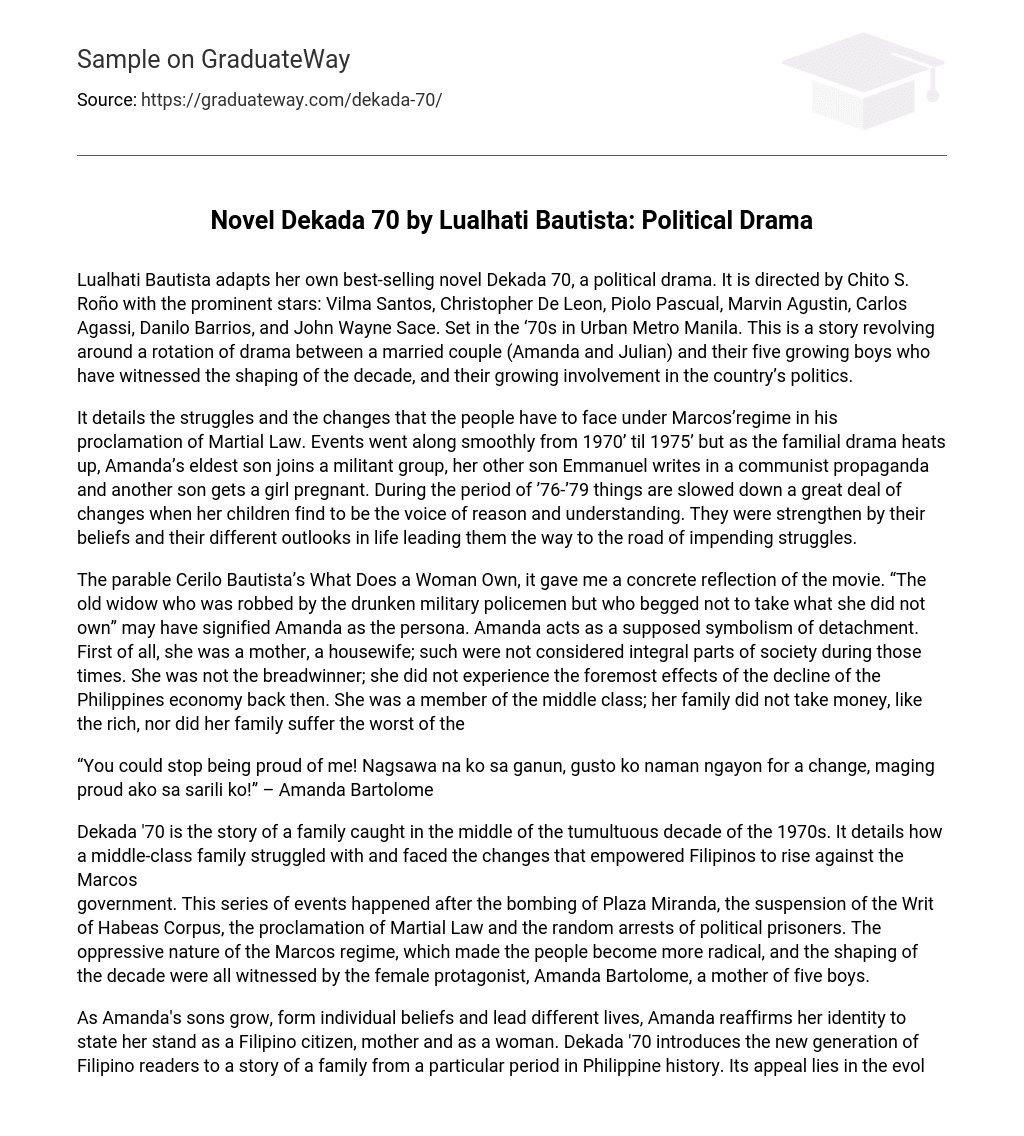Lualhati Bautista adapts her own best-selling novel Dekada 70, a political drama. It is directed by Chito S. Roño with the prominent stars: Vilma Santos, Christopher De Leon, Piolo Pascual, Marvin Agustin, Carlos Agassi, Danilo Barrios, and John Wayne Sace. Set in the ‘70s in Urban Metro Manila. This is a story revolving around a rotation of drama between a married couple (Amanda and Julian) and their five growing boys who have witnessed the shaping of the decade, and their growing involvement in the country’s politics.
It details the struggles and the changes that the people have to face under Marcos’regime in his proclamation of Martial Law. Events went along smoothly from 1970’ til 1975’ but as the familial drama heats up, Amanda’s eldest son joins a militant group, her other son Emmanuel writes in a communist propaganda and another son gets a girl pregnant. During the period of ’76-’79 things are slowed down a great deal of changes when her children find to be the voice of reason and understanding. They were strengthen by their beliefs and their different outlooks in life leading them the way to the road of impending struggles.
The parable Cerilo Bautista’s What Does a Woman Own, it gave me a concrete reflection of the movie. “The old widow who was robbed by the drunken military policemen but who begged not to take what she did not own” may have signified Amanda as the persona. Amanda acts as a supposed symbolism of detachment. First of all, she was a mother, a housewife; such were not considered integral parts of society during those times. She was not the breadwinner; she did not experience the foremost effects of the decline of the Philippines economy back then. She was a member of the middle class; her family did not take money, like the rich, nor did her family suffer the worst of the
“You could stop being proud of me! Nagsawa na ko sa ganun, gusto ko naman ngayon for a change, maging proud ako sa sarili ko!” – Amanda Bartolome
Dekada ’70 is the story of a family caught in the middle of the tumultuous decade of the 1970s. It details how a middle-class family struggled with and faced the changes that empowered Filipinos to rise against the Marcos
government. This series of events happened after the bombing of Plaza Miranda, the suspension of the Writ of Habeas Corpus, the proclamation of Martial Law and the random arrests of political prisoners. The oppressive nature of the Marcos regime, which made the people become more radical, and the shaping of the decade were all witnessed by the female protagonist, Amanda Bartolome, a mother of five boys.
As Amanda’s sons grow, form individual beliefs and lead different lives, Amanda reaffirms her identity to state her stand as a Filipino citizen, mother and as a woman. Dekada ’70 introduces the new generation of Filipino readers to a story of a family from a particular period in Philippine history. Its appeal lies in the evolution of its characters that embody the new generation of Filipinos, as well as being the story about a mother and her family, and the society around them that affects them. It is a tale of how a mother becomes torn between the letter of the law and her responsibilities as a mother. A defining but not subversive Filipino novel, Dekada ’70 was one of the two grand prize winners for the 1983 Palanca Awards for the novel.[2] It was adapted into a film by Star Cinema in 2002, starring Christopher de Leon and Vilma Santos.





